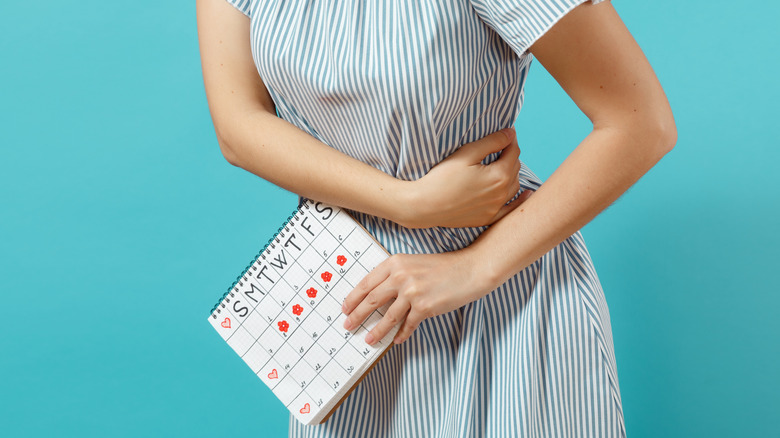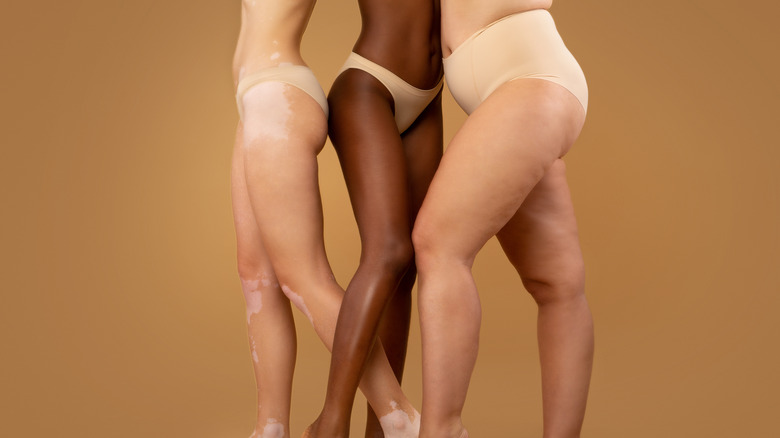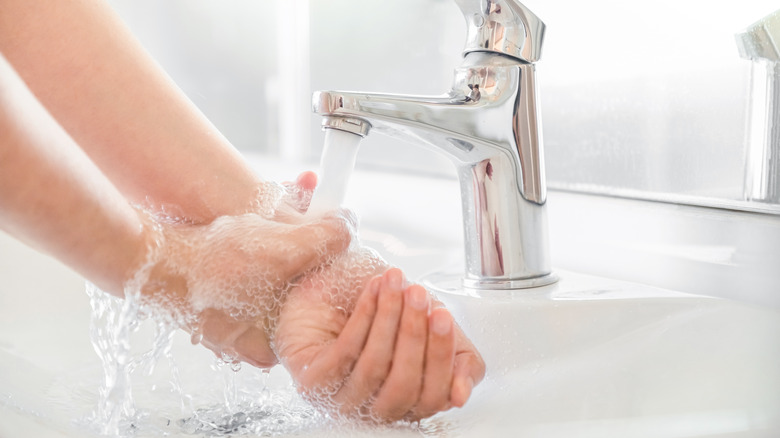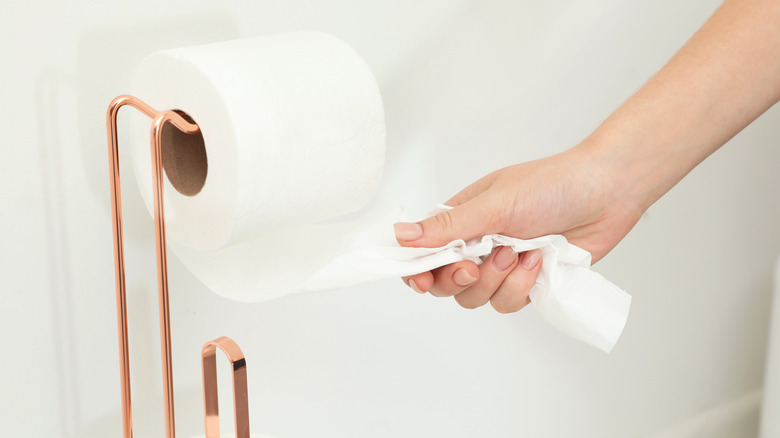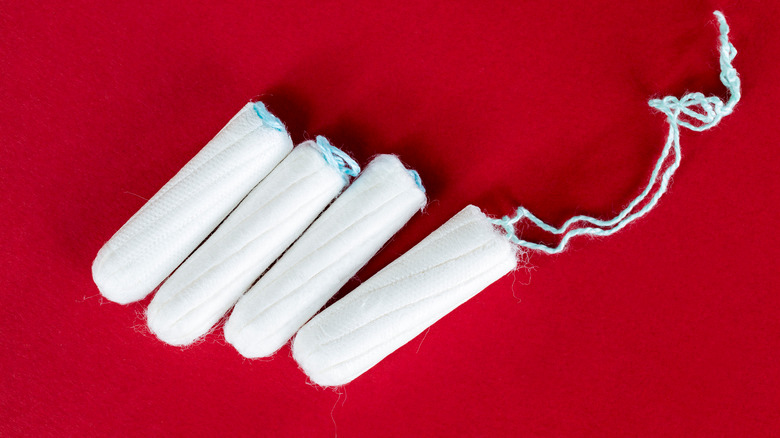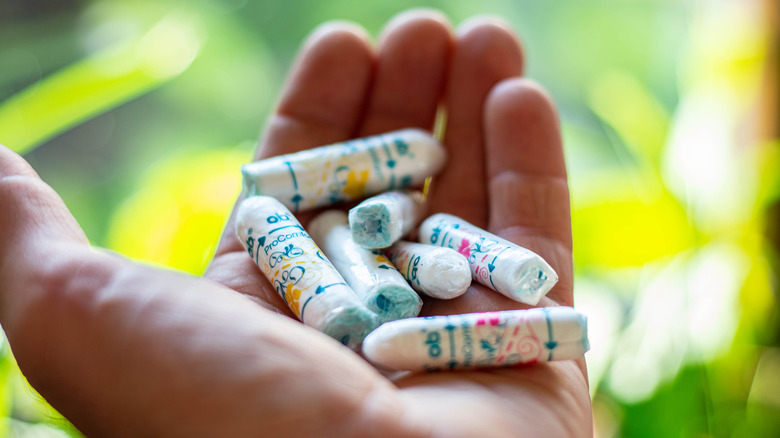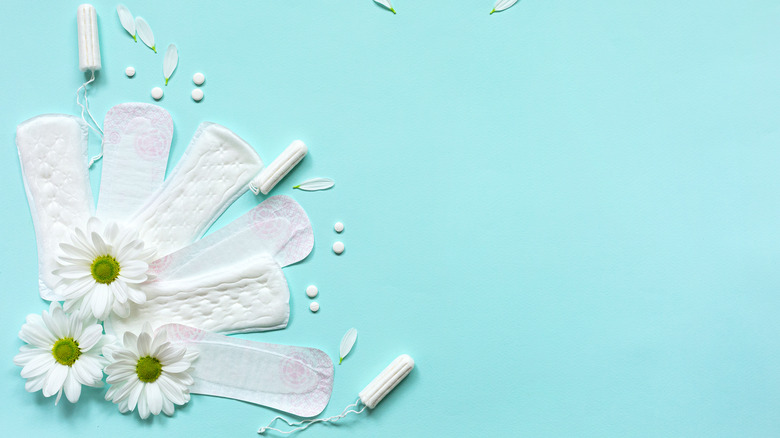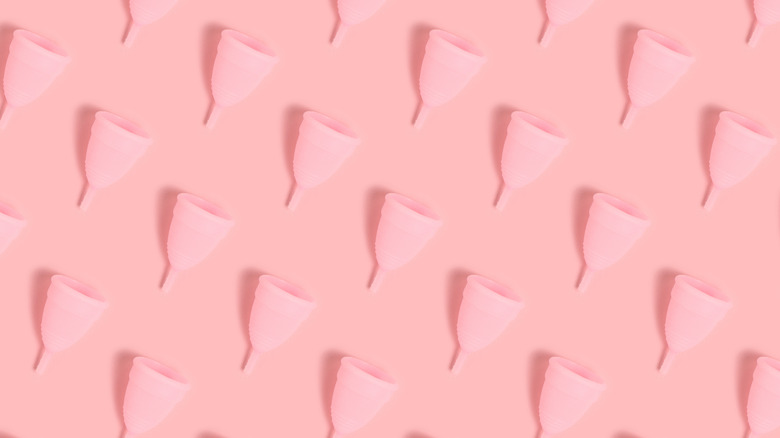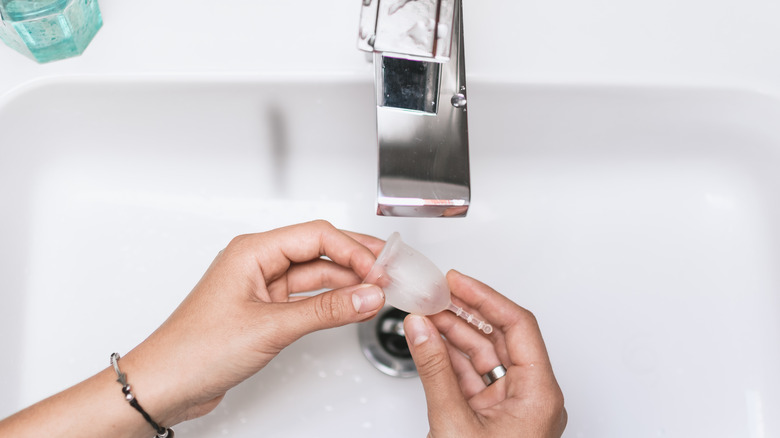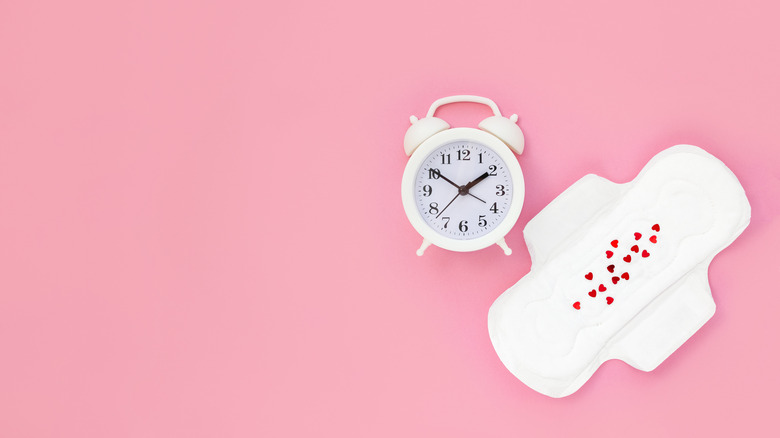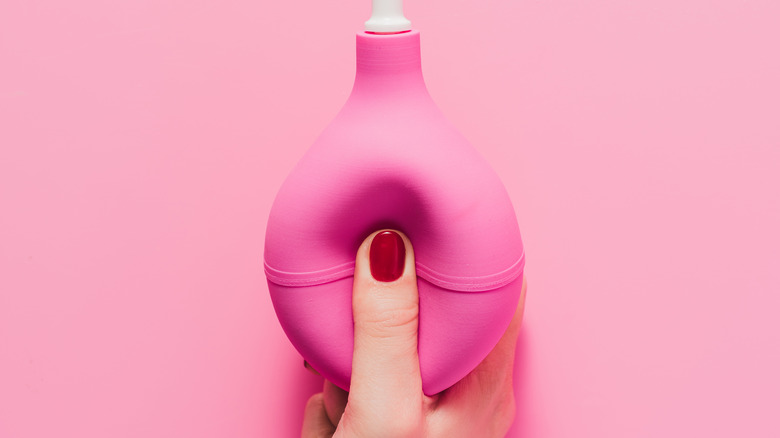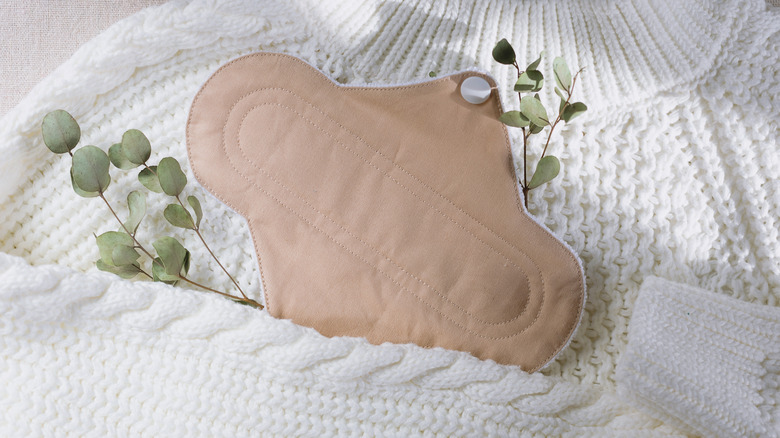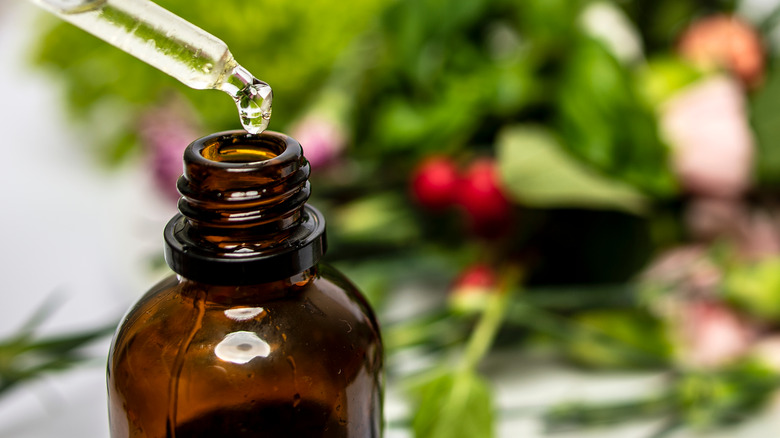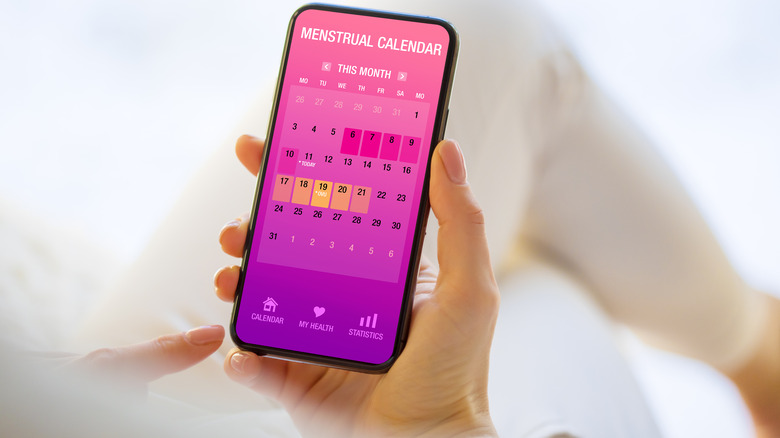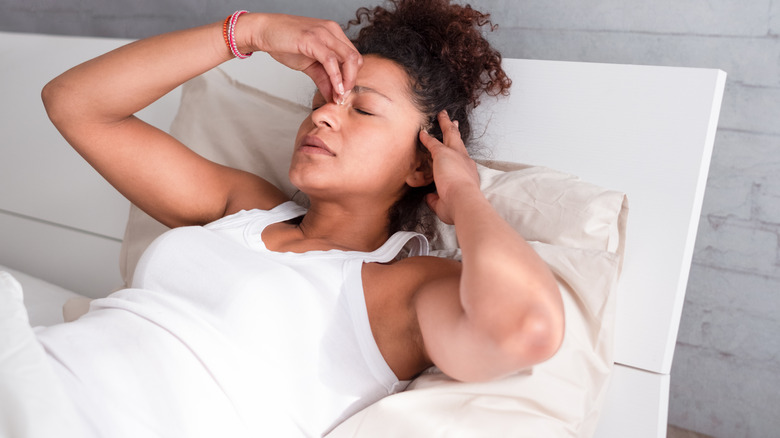Mistakes Everyone Makes With Period Products
With so many new menstrual products coming onto the market all the time, there is a constant learning curve in figuring out which might be best for you, and how to use them. Furthermore, as more information becomes available on best sanitary practices regarding menstrual products we already know and love, the learning process is truly never-ending.
While processes might seem glaringly obvious to some, studies have shown that not all women around the world have equal access to information surrounding menstrual hygiene. According to a 2018 study that was carried out in India, girls, particularly in rural areas, had "little, inaccurate, or incomplete knowledge about menstruation" (via Journal of Environmental and Public Health). The study also mentioned that women in rural areas of the country did not have access to period products, "or they know very little about the types and method of using them or are unable to afford such products due to high cost."
While those of us in the U.S. are fortunate in the sense that we have more access to information about menstrual health and more resources available, there is still much to learn. Continue reading to learn about — and correct — some of the common mistakes women make with their period products.
Washing period underwear incorrectly
Period underwear is a relatively new menstrual product on the market, and it has been praised for its high level of protection and comfort (via Glamour). It also comes in a range of styles including thongs, so there's no need to fall back on bulky or uncomfortable underwear during your cycle. Period underwear look almost exactly like regular underwear, only they are specifically engineered with fabric that absorbs your flow. Ob-gyn and adviser for pH-D Feminine Health, Ruth Arumala told Glamour that "Just like each woman, period underwear types are unique and serve different purposes. Some create an extra barrier of protection from leakage; others take the place of other feminine hygiene products."
The crux with period underwear, however, is they cannot be worn for more than 24 hours, and need to be washed almost immediately after use in order for them to not start smelling. The common mistake most people make is not giving them a rinse in cold water before throwing them in the wash. Keep in mind that the underwear will have soaked up all of your blood, so tossing them in with the rest of your laundry without properly rinsing and wringing them first will more than likely stain your clothes. Once rinsed with cold water, you can throw them in with the rest of your clothes in a delicate, cold-water cycle.
Not washing your hands before inserting menstrual products
You've heard of washing your hands after using the bathroom (hopefully), but before? You heard right. It might seem strange, but there are several reasons why washing your hands before you insert menstrual products — whether they are tampons, menstrual cups, etc. — is the way to go. Michael Ingber, a board certified doctor of urology, female pelvic medicine, and reconstructive surgery spoke to Health Nation on the subject: "Women should always have clean hands when inserting a tampon. They should wash with soap and water to minimize introduction of any harmful bacteria into the vagina."
The same logic applies for menstrual cups or any other product that is being inserted into the vagina. If you're not in a position to wash your hands with soap and water, ob-gyn Laurence Orbuch turning to a bottle of antibacterial liquid. He told Health Nation, "If there's really no clean water anywhere, at least you'll be able to use it to wash your hands."
Not changing your tampon after pooping
This one might make you wince, but it's important to take into account nonetheless. If your tampon string is hanging down when you're going number two, it is more than likely going to be in touch with fecal matter (via Health Nation). Having the potentially bacteria-laden tampon string so close to the vaginal region is not a good idea. Why is that? "Women may be more prone to getting a vaginal or urinary infection if there is gross fecal contamination in the region," physician Michael Ingber shares with Health Nation.
The bacteria E.coli is found in feces and can lead to urinary tract infections as well as bacterial vaginosis if proper precautions aren't taken. Bacterial vaginosis is a relatively common condition, and according to a 2016 study published in The Journal of Infectious Diseases, an estimated 10-30% of women are said to have experienced the infection. Symptoms include vaginal odor and discharge, and the study suggests one of the primary ways to get it is through "the inoculation of fecal microbiota into the vagina, which leads to a change in pH." If for some reason you are not able to change your tampon after number two, just be sure you are always wiping front to back, and double check the string before you finish up.
Using bleached tampons
A lot of information has been gathered in recent years about how exactly tampons are made and what goes into them. You might be surprised to know that conventional tampons can contain a variety of unsafe chemicals including pesticide residue from non-organic cotton, and dioxin, a residue of bleach (via Prevention and National Center for Health Research).
Although the FDA has dismissed many concerns related to the level of dioxin in tampons, research suggests that the accumulation of these chemicals over time in the sensitive and permeable vaginal tissue is cause for greater alarm (via Prevention). Eden Fromberg, an integrative ob-gyn, told Prevention that "Women absolutely do need to be concerned about pesticides and dioxin exposure from tampons and pads. Numerous medical journals and scientists have called for these substances to be better regulated." Some of the potential long-term effects from exposure to these chemicals include gastrointestinal disorders, reproductive harm, early menopause, endocrine disruption, and cancer, according to two studies published by The Journal of Environmental Science and Health and Frontiers in Public Health. Luckily, organic and unbleached tampons are available on the market, so you can have a worry-free period by going straight for those.
Not using the right size tampon for your flow
Light, regular, super...it might not seem that complicated (and technically it isn't), however there is a trick to using the right size tampon that you may not have considered before. For those with a heavy flow, it might seem smart to use a super tampon for extra protection, but according to a scientific study published by The Center for Health Research, the use of high absorbency tampons produced with rayon — which are a majority of the tampons available in today's market — can increase the risk of toxic shock syndrome (TSS).
The study says that after news of TSS was widely circulated in the 80's, a bulk of the highest absorbency tampons were taken off the market. The FDA was then required to label all tampon packages to warn women of the dangers of TSS and to advise them to use the lowest absorbency tampons available. While some of the synthetic ingredients that were used for increased absorbance have been removed, rayon is one of the older ingredients that is still used in the production of tampons today. Thankfully, incidences of TSS have reduced dramatically over the years because of continued education and changes. According to a study published by StatPearls, TSS is now estimated to affect only 0.8 to 3.4 women per 100,000 in the U.S. annually. With that said, it is still best to be careful. To prevent any risk of TSS, the best strategy is to use regular absorbency tampons instead of super, and change them more frequently.
Using scented products
It's natural that you may develop a slight odor during your period, especially if you are using menstrual pads, as they trap a lot of moisture and can be a breeding ground for bacteria. While it makes sense to want to combat odor by reaching for a scented product, it's probably best to think twice on this one. Certified nurse practitioner Dana Leslie, told the Cleveland Clinic about the dangers of using scented menstrual products, as well as some of the myths surrounding feminine hygiene in general: "The idea that the vagina is dirty and needs to be cleaned is simply not true. For centuries women have been told this and it's not only causing unnecessary distress, but it's a dangerous message to send," she says.
In fact, using scented feminine products around the delicate vaginal area can both upset its pH and the balance of good and bad bacteria, which can lead to a whole host of problems, including "irritation, itching, infection, or an allergic reaction." As you are shopping for pads or tampons, be sure to read the label carefully and avoid any added chemicals or anything that claims to have a "clean" scent.
Buying the wrong size menstrual cup
While menstrual cups have been around for a while (since the 1800's, actually), they have only recently gained popularity as an alternative to pads and tampons (via Cleveland Clinic). Menstrual cups can be great alternatives to pads and tampons in that they are affordable, can hold more blood, have a wear time of up to 12 hours, are comfortable to wear once in, and have less environmental impact than disposable products. While the idea of using a menstrual cup may be intimidating for some, but it doesn't have to be. While there are several factors to consider when deciding which cup is right for you, size is definitely one of the more important ones.
Because all women are different, there is no one-size fits all menstrual cup. Depending on the brand, you could potentially be choosing between two sizes or even ten. Different factors including your age, your flow, whether you have given birth, where your cervix is positioned, and how sensitive your bladder is can all affect which size cup is good for you. After you select your brand, be sure to carefully read the indications and consider all of those factors before you make your choice. If all of that seems too much, the Cleveland Clinic suggests speaking directly to your gynecologist and having them work with you on finding the right fit.
Improperly cleaning your menstrual cup
After you've found the perfect fit, it's time to learn how to properly clean your menstrual cup. While maintenance of cups is pretty simple, it's important to clean them properly to avoid bacterial growth that could lead to infection. Dr. Felice Gersh, founder and director of the Integrative Medical Group of Irvine, spoke to Bustle and explained the "why" behind keeping your cup clean: "Cleaning a menstrual cup according to the manufacturer's instructions is important to maintain the integrity of the material of the cup — so it doesn't develop cracks or holes and result in the leakage of the menstrual blood," she explains.
One rule to remember is not to use scented soap on your cup, especially during your cycle. Instead, you could opt for a gentler cleaning agent like vinegar between uses, which can be diluted with nine times as much water. Also, be sure to clean out the small holes on the rim of your cup between uses to avoid buildup of menstrual fluid. Those can be gently cleaned out with a toothbrush.
When you are finished with your cycle, it is time to sanitize your cup by boiling it. Fill up a small pot with water, and once the water is boiling, place the cup in the pot and let it boil for 10 minutes. There is no need to worry about damaging the cup by doing this — they are all made from medical-grade material that can handle the heat.
Not changing your pad often enough
Everyone gets busy. It's easy to get distracted and forget to change your pad, but if you want to stay clean and leak-free during your cycle, it's an absolute necessity. How often you change your pad will likely depend on how heavy your flow is, and therefore how soaked your pad is (via Healthline). Another key indicator that it's time to change your pad is the smell. As mentioned earlier, it's easy for odor to develop with pads because moisture is collecting in such a confined space.
According to the American College of Obstetricians and Gynecologists, pads should be changed on average every four to eight hours. However if you have a heavy flow and notice your pads soaking through, are doing an active sport, or generally notice an odor developing, it's safe to change them more often (via Healthline). It's also a good idea to put on a fresh pad right before bed to avoid any nighttime leaks, and to change it first thing in the morning.
Douching to eliminate odor
While this day in age douching has a pretty bad rap, unfortunately there are still a number of women who use these products. According to the Office on Women's Health, one in five women in the U.S. ages 15 to 44 still use douches. While some women think that douching — which is washing the inside of the vagina with water or cleansing agents — might help clean the vagina and eliminate odor, studies have shown there is no benefit to douching and that it actually causes more problems than it solves. The Office on Women's Health says that not only do they increase your risk of certain health problems, they can also lead to fertility issues. While period odors may be uncomfortable to deal with, douching is not a healthy or advisable solution to manage that.
Douching disrupts the balance of good and bad bacteria in the vagina and can lead to yeast infections and bacterial vaginosis. Furthermore, if you already have these conditions, douching can push them further up into the uterus, ovaries, and fallopian tubes, potentially leading to pelvic inflammatory disease. If you are embarrassed about period odor, the best tip is to leave the vagina alone and to gently wash the vulva with warm water and unscented soap during your cycle to eliminate any smell.
Not using reusable products
It's no secret that the excessive use of plastic and non-biodegradable material is causing harm to our planet (via ClinMed). Non-reusable menstrual products are considered largely unsustainable, and people are taking note. Ann Borowski, an expert who researched the ecological impact of sanitary products, told National Geographic that "I don't want to contribute 40 years of garbage to a landfill just to manage something that shouldn't even be seen as a problem." She added, "It seems like something we should have a little more control of by now. I don't want to have that kind of burden on the planet."
Between applicators, plastic wrappers, adhesives, and packaging, many non-biodegradable elements go into the production of menstrual products. Luckily, change is in the air, and more and more re-usable products are on the market now that can help cut back on waste. These include re-usable pads, menstrual cups, menstrual discs, period underwear, and even period sponges.
Not trying natural remedies
Periods can come with a host of inconvenient ailments like bloating, mood swings, cramps, tender breasts, and acne (via Cleveland Clinic). While there are a lot of over-the-counter medications that could potentially help, there are also a lot of natural remedies you can try. Emmett J. Hughes, an associate professor of basic and clinical sciences at the University of Bridgeport, spoke to Good Housekeeping about a novel way to help reduce cramping: "Magnesium helps to relax the myometrium — the muscular layer of the uterus. Think Epsom salt. Magnesium is its primary ingredient." Hughes suggests taking either liquid magnesium or magnesium citrate tablets three to four days before your period, or eating foods that are rich in magnesium like avocados, whole grains, and leafy greens.
If mood swings are your thing, a natural alternative could be chasteberry. While its efficacy to treat period symptoms hasn't yet been clinically proven, according to the University of Rochester Medical Center, the herb has been used to manage menstrual cycle issues including PMS and pain. The medical center explains that berries from the tree may help stimulate progesterone, which is the hormone that elevates two weeks before menstruation begins and is linked to PMS — but more research is needed to confirm this connection.
If you are someone who deals with a heavy flow, there are herbal tinctures that can help reduce bleeding. According to a study published by The Journal of the Canadian Chiropractic Association, red raspberry leaf, cinnamon, Shepard's Purse, and yarrow are just a few of the herbs that can help manage excessive bleeding.
Not using a period tracker
Tracking your cycle may seem like another annoying thing on your to-do list, but it actually comes with more benefits than you'd expect. Besides the convenience of knowing almost exactly to the day when your period is going start, it can help you track your fertility, better prepare for PMS, and alert you to any irregularities in your cycle (via Women's Health).
Rashmi Kudesia, reproductive endocrinologist and clinical assistant professor of obstetrics and gynecology at Houston Methodist, told Women's Health that "Changes to your cycle, or abnormalities — like irregular or heavy bleeding, or severe pain — can all signal issues that benefit from medical evaluation. If something suddenly changes with your cycle, or your period is late, you may not realize it right away if you're not keeping track." The accuracy of the application will improve the longer you use it, as it will have more historical data to work with and can better predict your cycle length and fertility window.
Leaving your tampon in too long
As you are probably already aware, there is a safety window for wearing almost all period products, and leaving your tampon in for too long is one of the most common mistakes people make during that time of the month. Tampons, like pads, are only meant to be worn for four to eight hours (via Healthline). Although it's very rare, according to the FDA, leaving a tampon in for more than the recommended time can lead to toxic shock syndrome (TSS), which includes symptoms such as "a sudden fever (usually 102°F or more), vomiting, diarrhea, fainting or feeling like you are going to faint when standing up, dizziness, or a rash that looks like a sunburn." If you experience any of these symptoms either during or after your period, the FDA recommends seeking immediate medical attention. Some more common negative effects of leaving a tampon in too long include the risk for infections such as vaginitis, bacterial vaginosis, and genital contact allergy (via Healthline).
With that said, one of the primary questions about tampon use is whether they can be worn while you sleep. If you sleep eight hours or less, they are fine to use, but if you sleep any more, it may be better to find an alternative nighttime product (via Healthline).

